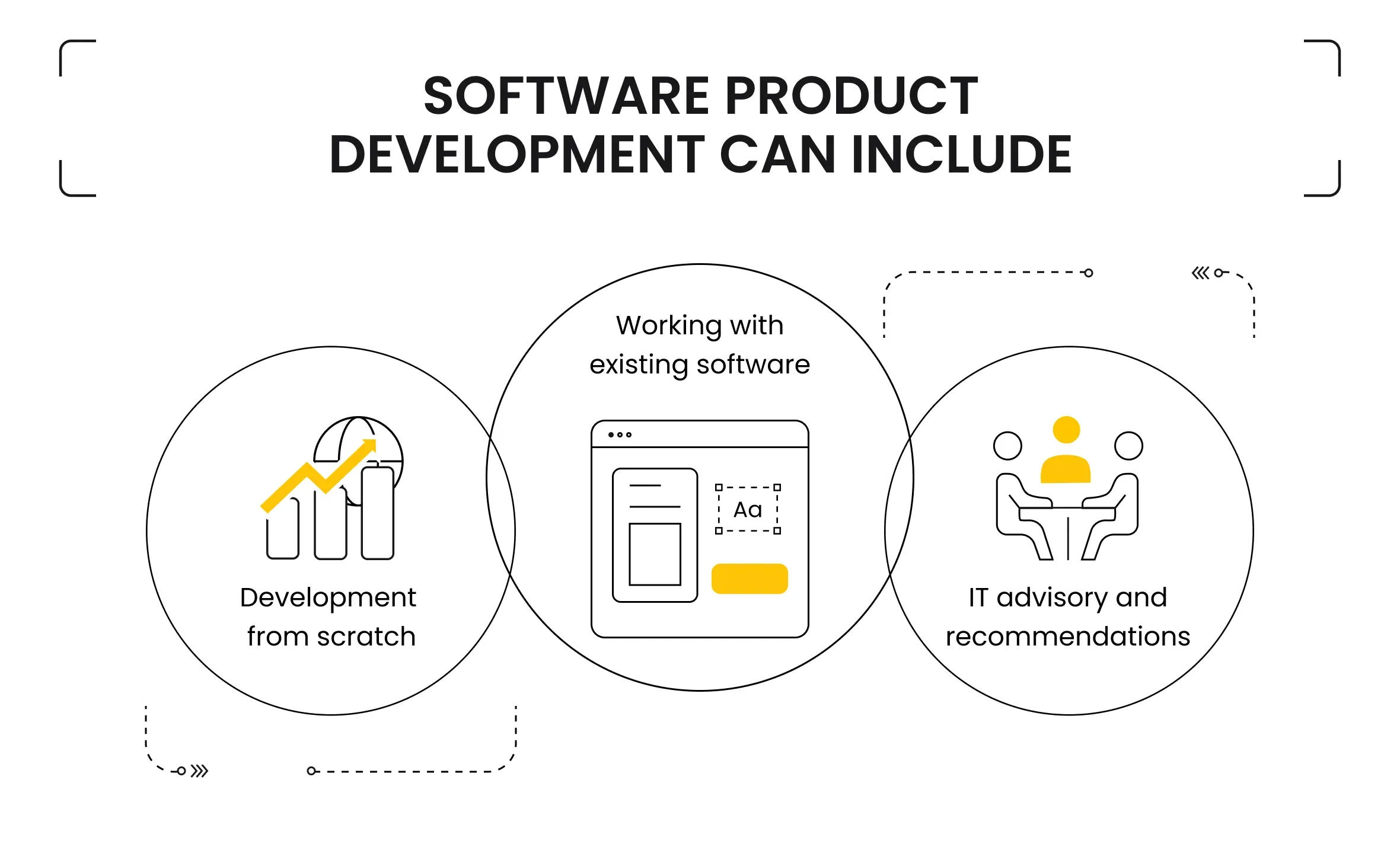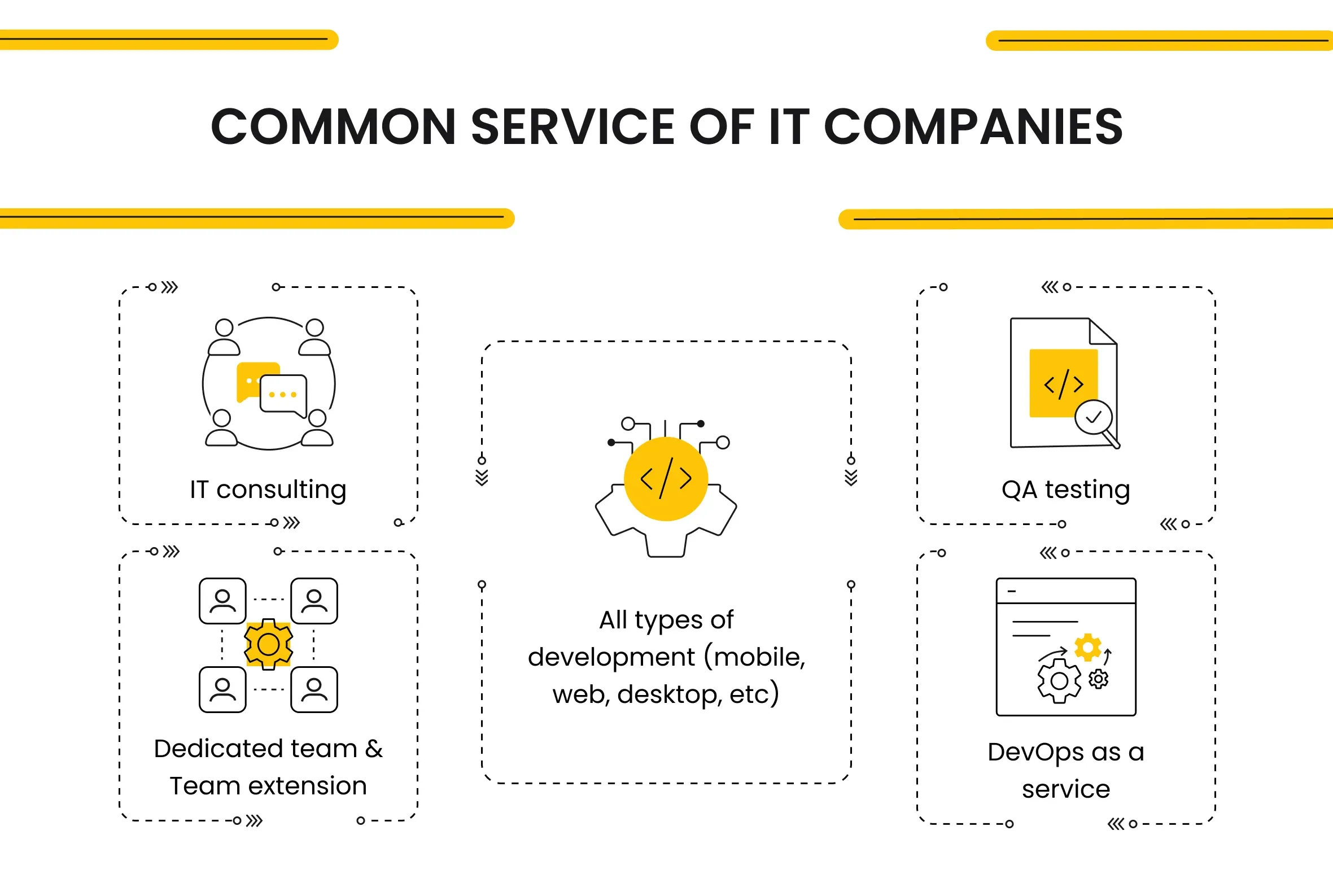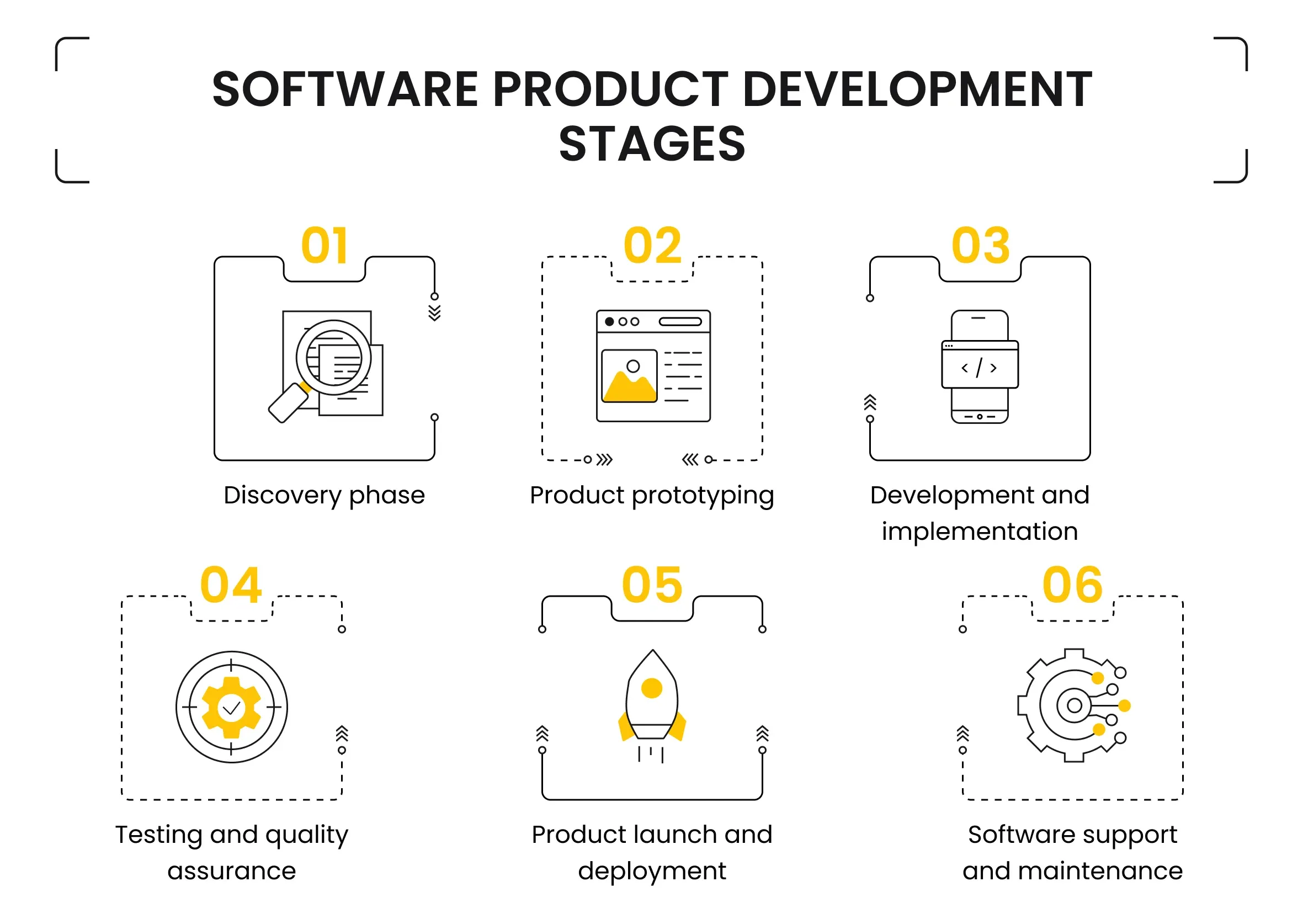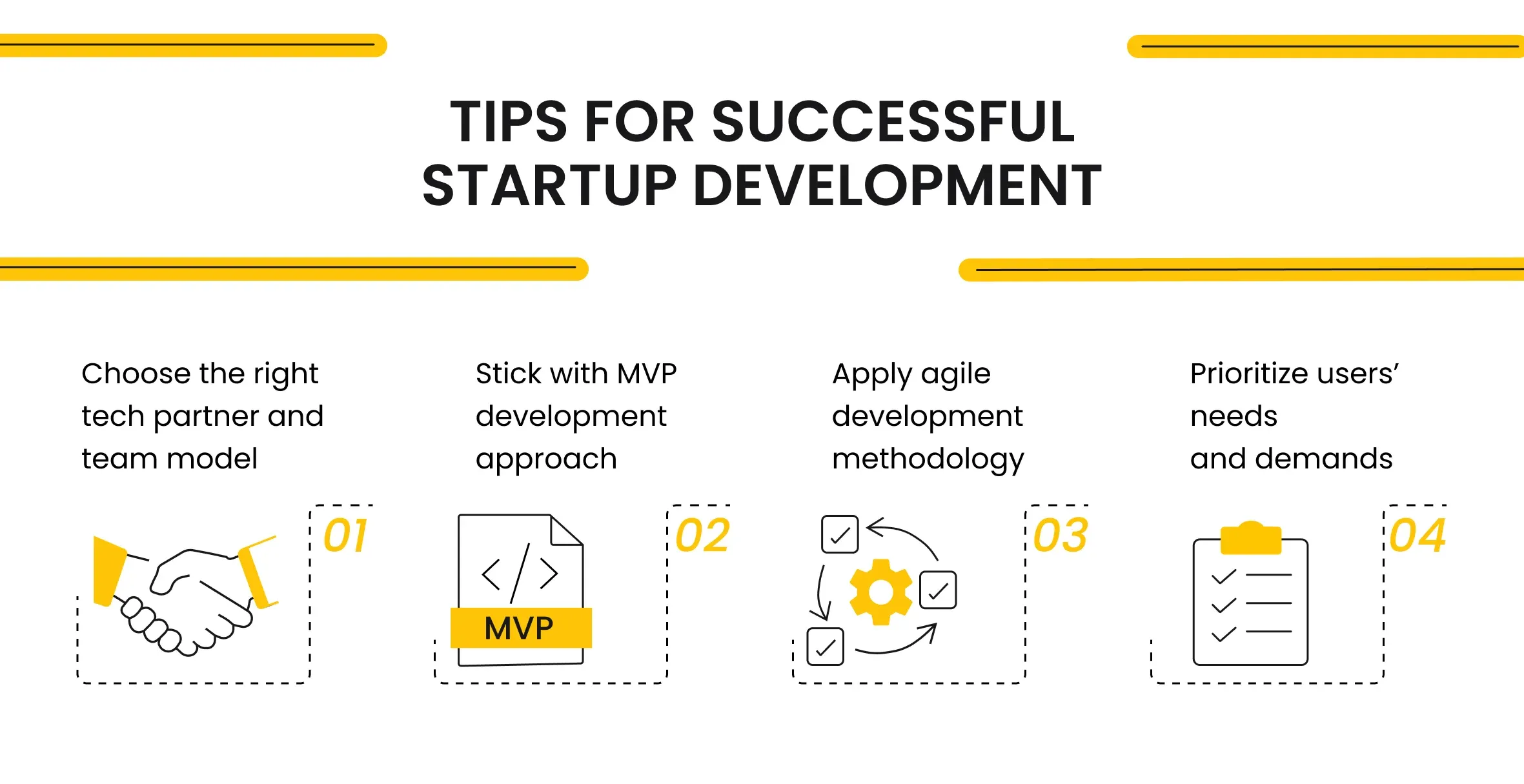Software Product Development Services for Startups: A Step-by-Step Approach
September 11, 2024 • 145 Views • 20 min read
Tetiana Stoyko
CTO & Co-Founder
Software product development for startup is a well-known service commonly used in different industries and fields.
Most modern startups prefer to go further and choose outsourced software product development over maintaining an in-house team for many reasons.
To cut a long story short, we prepared a complete guide on software development for startups to dot the i’s and cross the t’s and to explain all the significant aspects, benefits, and challenges related to such services.
Understanding Software Product Development
Let’s start with the basics.

One of the most common misconceptions is that software product development always takes place from scratch. In fact, it involves many practices and approaches, which can significantly vary depending on the project context, business needs, and customer demands. For illustration, software product development can include:
- Creating software solutions from scratch when the business owner has a general idea of future software and seeks dedicated development team services who can fulfill and embody them.
- Optimization and modernization of existing software occur when developers are hired to improve and upgrade the existing software, find ways to modernize it, integrate new features, etc.
- IT advisory and recommendations when business owners hire IT consultants to analyze business needs, existing software, or ideas for future systems to find the best and most efficient way to implement changes.
The foregoing is just a short list of the most common software product development approaches. The rest of the subcategories can significantly vary and transform according to specific and unique demands and requirements.
However, software product development for startup is primarily about developing full-fledged software from scratch. The reason for this is simple:
Outsourced software product development is ideal for startups because it offers experience and expertise as a service at affordable prices and convenient cooperation terms. So, startups with limited resources and development skills can achieve the demanded results while still saving time and resources on processes related to software development.
Essential Services Offered by Software Product Development Companies

Talking about software product development services for startups, it is possible to name a few essential options that are must-haves for most IT companies:
- Dedicated software development teams
- Team extension options
- DevOps as a service
- CTO on demand
- IT Consulting
- QA testing
Still, one of the most popular options startups choose is end-to-end software product development. To simplify, startup owners consider software development companies to be technology partners:
While an in-house startup team covers various aspects of management, product idealization, and conceptualization, an outsourced development company chooses the most suited technologies and development approaches, as well as other aspects related to coding and working with software.
Still, part-time services like team extension or dedicated development teams are also a common choice when a business needs limited development solutions like creating and integrating new features, adjusting IT infrastructure, bug hunting and QA testing, and many other similar processes.
Outsourced companies also offer niche expertise in the software product development life cycle. For example, some companies have rich experience in mobile and web development, some - in DevOps and cloud computing, and others are more experienced in working with innovative technologies such as blockchain and artificial intelligence.
To sum up, in addition to more general services, software product development for startup can include more particular solutions like:
- Mobile app development
- Building a web application
- DevOps and process automatization on demand
- Software testing and quality assurance services
- Cloud computing options
- Application support and maintenance
What Are The Stages Of Software Product Development for Startups?
Most software product development services for startups vary highly, depending on the context of the project and business needs. For instance, working with existing software, regardless of its purpose (customization, improvement, feature integration, etc), demands a unique and personalized approach.

Alternatively, it is possible to define six main steps to full-fledged software product development for startup:
- Discovery and ideation stage
- Product design and prototyping
- MVP development and implementation
- Testing and quality assurance phase
- Product launch and deployment
- Post-launch software support and maintenance
So, let’s discuss them in detail for a deeper understanding of each step.
Step 1: Discovery and Ideation
Regarding software product development, skipping the first and most crucial step of idea discovery and conceptualization is impossible.
To put it simply, during this phase, business owners must define a general idea of their future product, what goal they want to achieve with this software, and the current market situation.
After a broad understanding of their market, target audience, industry specifics, and leading services, business owners must also decide on and define various product details.
These details are different and include numerous elements, starting with user interface specifics and ending with the built-in features. Frankly, it is almost impossible to define all of them initially. The list will grow after discussing the project idea with the software team. Finally, business owners and developers will come up with new ideas or out-of-box solutions while developing software products and facing various challenges.
Nevertheless, the more detailed the project conceptualization at the initial phase, the easier it will be to achieve the goal and fulfill as many tasks as possible. Thus, write down every possible idea that comes to mind, and consider it after.
In fact, this phase is also one of the longest and might take place during the whole software product development life cycle.
Step 2: Product Design and Prototyping
After creating a general concept of your future software product development project finding and hiring software developers for startup, they can start product design and prototyping.
The idea behind this stage is simple: Using the general concept of future projects and instructions or other software requirements as a guide, software engineers will create a prototype of the software you demand.
Clearly, this prototype won’t be a working concept but rather a visualization of your ideas. Still, this is an excellent instrument for showing the approximate results of potential software product development. This view of the final results allows for implementing changes and making other adjustments before the development starts.
During prototyping, developers will visualize the software's appearance and explain its core principles to ensure everyone understands the basics of the software solution.
Step 3: MVP Development and Implementation
One of the most efficient startup software development approaches is building a Minimum Viable Product, or simply MVP.
In a nutshell, a minimum viable product is the simplest version of a software application that suggests integrating only the must-have features and providing core services. It might seem odd, yet countless MVP benefits justify the popularity of this approach.
For example, MVP startup software development significantly cuts development expenses and reduces development-to-launch time. So, startup companies with limited resources can design and deliver a desired product that will serve only the essentials. Besides, it will be a faster and easier task thanks to avoiding unessential solutions and development practices.
MVP is an ideal approach for a faster app monetization strategy and idea testing: by cutting development time, startups can proceed faster to considering and testing their business idea and software solution, gathering and analyzing user feedback, and adjusting the further development and scaling strategy to meet users' expectations.
Moreover, MVP startup software development helps to avoid risks and unreasonable spending. When you have a limited number of features to develop, you won’t spend time and resources implementing unneeded functionality.
However, despite all the advantages of MVP software development for startup, some businesses still choose full-fledged app development over it due to personal reasons. In such cases, the development stage looks almost identical, with the only important difference:
In terms of MVP development, both parties discuss each possible feature or other development process to reduce the scale of work and achieve the bare minimum for a faster software launch.
At the same time, building full-fledged software is usually less discussed: business owners define and explain their expectations for the final results, and the software development team for startup estimates the scale of work and needed resources, offering a few potential solutions to optimize them. Yet, these are recommendations rather than instructions for development.
Step 4: Testing and Quality Assurance
In fact, software testing and quality assurance are much longer processes than a single phase. They start during the development stage and ultimately end after post-launch maintenance.
To cut a long story short, bugs and various errors are always present, and it is impossible to fix all of them. Still, you can prioritize the most crucial or noticeable and take care of them, gradually proceeding to less significant issues.
So, as soon as software developers for startups create the first code-based component that works, your testers and QA specialists can start their work. From our experience, engaging testers in the early development phases helps optimize and polish the product faster and improve software quality.
Clearly, you won’t wait for your testing team to identify all the mistakes, bugs, or other issues. So, by engaging them from the beginning, you can locate high-priority QA tasks faster and fix them as soon as possible. The rest can be polished after the software launch, reducing the develop-to-launch time.
Step 5: Launch and Deployment
After fixing all major bugs and errors in an app's software base, startup software developers can start deploying the code and launching the application.
Frankly, the last month before going live is one of the most stressful periods in the software product development life cycle. One of this stage's most important tasks is ensuring the best communication and response within a team.
Regardless of how prepared you are, you will eventually face stress and countless challenges and learn about numerous aspects that can be improved. So, apart from ensuring communication and the fastest task resolution, it is essential to know the limits:
Admit that you can’t wait until the software product is ideal (it will never be), and define the most critical aspects to take care of before going live. The remaining less crucial tasks can be handled during the support and maintenance step.
Step 6: Post-Launch Support and Maintenance
Finally, you can celebrate when you successfully launch your startup product development solution. However, get ready to deal with and resolve countless new tasks and challenges.
Further testing and quality assurance are just one of the future tasks. Regardless of your development approach, whether an MVP or a full-fledged app, you must prepare a business analysis team that will learn your business performance, analyze the target audience, its needs and demands, plan the ways for the following improvements and integrations, etc.
To rephrase, the fun time has just begun. As a business owner, you will have many more responsibilities and tasks related to software management and scaling.
Tips for Successful Startup Product Development
Truth to be told, all the foregoing seems relatively simple and general. Don’t be fooled because this impression disappears when, instead of talking, you must act.

Even the most straightforward and most apparent statements will look totally different when you start embodying ideas into reality. It becomes elementary to lose your focus and get distracted from your priorities. So, we also created a brief guide and checklist to ensure the success of your software product development for startup.
Choosing the Right Team (In-House Team vs. Outsourcing)
One of the most important decisions to make regarding software development for startup is to choose the team management and cooperation approach.
Comparing in-house team vs outsourcing is commonly narrowed down to a few most apparent factors:
- How fast can you find and hire a full-fledged team
- Cost of software developers for startups
- Niche experience and expertise of software development team for startup
- Convenience of team management and communication
Nevertheless, choosing between working with an outsourced software product development company for startups and gathering an in-house development team brings many other less obvious yet critical challenges.
For instance, even the slightest inconveniences in team management and communication might result in a total mess and chaos during development. Alternatively, higher developer salaries and unpredicted expenses can result in a lack of funds to keep the project afloat.
Thus, don’t rush the decisions; take your time to make a balanced and informed choice about which team will be best for you.
Focus on the MVP (Minimum Viable Product)
Despite all the pros and cons of full-fledged software development, we highly encourage you to consider the MVP approach.
One of the most significant advantages of MVP software development for startup is that it can also be integrated into a traditional development strategy: you must prioritize the most crucial and essential features and functionality.
Thus, even if you already have ideas for further integrations and scaling, you can pause and test the basic app functionality better to understand the audience's and software's needs. The simplest way to switch from full-fledged app development to MVP is to choose Agile over plan-driven methodology.
Agile and Iterative Approach
There are numerous project management approaches and practices. Still, it is hard to argue that agile methodology is probably the most efficient in terms of software product development for startup.
For instance, the waterfall is ideal for larger and more complex software development projects when consistency is required. On the other hand, startups benefit more from agile and iterative teams, who prioritize fulfilling main tasks but can switch to urgent and unplanned tasks when needed.
We recommend considering an agile approach to create a startup product development solution.
Prioritizing Features Based on User Needs
Finally, don’t forget that the primary goal of any software product development for startup is to satisfy the target audience. This is the most crucial factor that defines the success of your product.
Frankly, users can commonly “forgive” minor bugs or limitations of services until you provide them with the most demanded and desired solutions. It doesn’t mean you can ignore improving and polishing your software app. However, while you offer unique and demanding services that work, you have all the chances to achieve business success.
Therefore, constantly monitor and analyze your clients' demands, try to predict their requirements and expectations, and prioritize their needs.
What’s your impression after reading this?
Love it!
1
Valuable
1
Exciting
1
Unsatisfied
1
FAQ
Let us address your doubts and clarify key points from the article for better understanding.
What is product development in startups?
Product development in startups refers to the process of designing, creating, and launching a new product or service. It involves identifying a market need, developing a solution, and continuously iterating based on user feedback. In startups, this process is typically fast-paced, with an emphasis on testing and adapting quickly to ensure the product meets customer demands and can scale effectively.
What should I look for in a software product development partner?
When choosing a software product development partner, look for technical expertise, relevant industry experience, and a strong portfolio. Ensure they have clear communication, a collaborative approach, and a proven track record of delivering on time and within budget. Also, consider their ability to understand your business needs, provide ongoing support, and adapt to changes as your project evolves.
What are the common challenges startups face in product development?
Startups often face challenges in product development such as limited resources, tight budgets, and time constraints. They may struggle with unclear product-market fit, evolving customer needs, and balancing speed with quality. Additionally, navigating technical complexities, managing cross-functional teams, and ensuring continuous iteration based on user feedback are common hurdles.
Why should a startup consider outsourcing development?
Startups should consider outsourcing development to access specialized expertise, reduce costs, and speed up time-to-market. Outsourcing allows them to focus on core business activities while leveraging external talent for technical work. It also offers flexibility, scalability, and the ability to tap into a broader pool of resources without the need for full-time hires.
What is the typical timeline for developing a software product?
The typical timeline for developing a software product can range from 3 to 12 months, depending on the project's complexity. Early stages involve planning and designing, followed by development, testing, and iterations based on feedback. Simpler products may take a few months, while more complex solutions with advanced features or integrations can take a year or more.
YOU MAY ALSO LIKE
Let’s talk!
This site uses cookies to improve your user experience. Read our Privacy Policy
Accept
Share this article